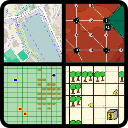Scenario 2016: Agents in the City
Our scenario consists of two teams of agents moving through the streets of a realistic city. The goal for each team is to earn as much money as possible. Money is rewarded for completing certain jobs. Jobs comprise the acquisition, assembling, and transportation of goods. These jobs can be created by either the system (environment) or one of the agent teams.There are two kind of jobs: priced and auctioned. A team can accept an auctioned job by bidding on it. The bid amount of money is the reward. If both teams bid, naturally the lowest bid wins. If a job is not completed in time, the corresponding team is fined. Priced job have a reward defined upfront, that is given to the first team to complete that job. The teams have to decide which jobs to complete and how to do that, i.e. where to get the resources and how to navigate the map considering targets like shops, warehouses, charging stations, storage facilities.
A team consists of different types of agents. The agents differ in their speed, how they move around the city, battery charge, the volume of goods they can carry, and which tools they can employ to craft other goods. Currently we have 4 types: cars, trucks, motorcycles, and drones.
Goods can be bought, crafted, given to a teammate, stored, delivered as part of a job completion, recovered from a storage facility, and dumped. These action may happen at their respective specific locations/facilities. The crafting of an item requires the use of other goods, some which serve as prime matter and some which serve as tools. Since each kind of agent can only handle a subset of the tools, the crafting of some goods require the explicit collaboration of 2 or more agents.
Agents posses a battery charge that gets decreased as they move around from one place to another. They need to make sure they never run out of charge, and therefore should plan their visits to the charging stations accordingly. Moving from one place to another, as well as recharging the battery at a charging station, are actions that are carried on only partially on each step, an may require several steps for completion.
Tournament points are distributed according to the amount of money a team owns at the end of the simulation. To get the most points, a team has to beat the other, as well as surpass a certain threshold. If a team has a large debt, points are deducted.
An overview of the scenario’s monitor during a sample simulation, in which only one team is active, can be seen at the top of this entry.
